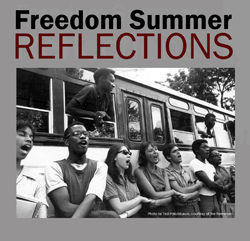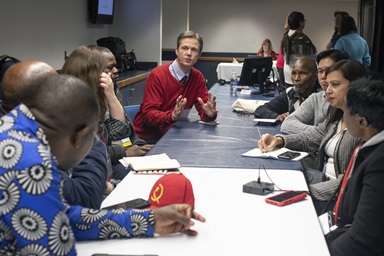
Responding to a request from black Methodist clergy in Mississippi, Dean Bogard Dunn led a small delegation of faculty and students there from The Methodist Theological School in Ohio. We whites were asked to join black colleagues in helping to keep public facilities, especially restaurants, desegregated.
As a 25-year-old seminarian, student pastor and father of two young children — with my young wife's fearful, and yet, solid support — I joined respected colleagues for a portion of Freedom Summer of 1964 in Jackson.
Memories from those chaotic days and fearful nights are written on my soul.
Visiting Mrs. Evers in the family bungalow with Medgar's blood still splattered on the driveway. Seeing the twisted face of Chaplain Ed King, whose car had been booby-trapped by the KKK. Singing and praying in black churches filled beyond capacity each night, as the community organized for Civil Rights, while the KKK encircled the buildings in trucks with spotlights glaring and guns loaded.
Playing basketball all night with black teens in a community center only to be told that for them this was the first they had been on a field or court with teenaged or young adult whites. Experiencing the unimaginable courage of unsung black folks, especially the very young and quite old, who not only stood tall in the face of a gathering storm of violence but also welcomed us as guests into their homes, knowing we would soon go home while their now targeted humble dwellings were the only homes they had.
Hardly being able to swallow superb food in Jackson's prestigious downtown cafeteria as we were taunted with vulgarities and attacked by silent expressions of vile hatred. Hearing black Methodist clergy repeatedly request the biblical scholars among us to tell the assembled congregations that the story of Ham in Genesis had nothing to do with black inferiority and the rightness of slavery, as the white church had insisted for centuries.
Recalling Dean Dunn's sermon, "It's Just Gotta Be So," through which we caught a glimpse of the New Jerusalem breaking in among us. Touching the raw courage of those assembled at the original Freedom School as (Student Nonviolent Coordinating Committee) SNCC-ers prepared to put their lives on the line for voting rights. Feeling the soul power of nonviolence that somehow would break the back of the racist powers and principalities deeply entrenched in that venomous moment.
Across the years, when at times demonized for active involvement in controversial justice movements, colleagues have asked, “How did you get the way you are? Why do you do the things you do?" My stammering response, always incomplete, invariably includes a reference to Freedom Summer, 1964, and the dream of the Kingdom, present and coming, which was made visible by those gallant voices and gorgeous faces I was privileged to hear and see 50 long years ago.
They indelibly wrote a new song, a not yet achieved vision, on my heart. Freedom Summer, 1964: Why was I there? Quite simply, because I could not, not have been there.
2014: Why am I who I am? Why do I stand where I do? Quite simply, because I cannot be or do otherwise. This, in large measure because of a long ago summer that remains for this old white preacher a still clear vision of tomorrow's hope.
*Sprague was elected bishop in 1996 and assigned to the Chicago area and Northern Illinois Annual (regional) Conference before he retired in 2004. He is known as a voice for peace, an inclusive church, racial justice and gender equality.
News media contact: Kathy L. Gilbert, Nashville, Tenn., (615) 742-5470 or [email protected].
Like what you're reading? Support the ministry of UM News! Your support ensures the latest denominational news, dynamic stories and informative articles will continue to connect our global community. Make a tax-deductible donation at ResourceUMC.org/GiveUMCom.




